"An essential and characteristic aspect of geography is the role of fieldwork and other forms of experiential learning in the development of knowledge and understanding."
Subject Benchmark Statement for Geography, UK Quality Assurance Agency (2019)
During 2020, the Council of Heads of Geography in UK Higher Education Institutions (CHGHEI) considered a range of intersecting issues related to taught undergraduate field courses. These included sustainability and carbon footprints of travel, accessibility, inclusivity and equality of opportunity, and issues of fieldwork and mental health.
In December 2020, the Heads unanimously agreed to five principles that should guide departments in the planning and delivery of the fieldwork provision for all undergraduate geography programmes. The intent of these principles is not to limit fieldwork opportunities - these are fundamental to a geographical education - but rather to ensure that departments develop their fieldwork programmes in ways which maximise the benefits of field education and minimise the disbenefits. The principles apply at programme, not module, level. Implementation should be guided by evidence and good practices.
Geography Programmes are encouraged to sign up to these principles to commit their support to the delivery of high quality and sustainable fieldwork for future generations of undergraduate students. In implementing these principles, the approach to decision making and annual monitoring should be transparent to all those involved, students and staff, and include a commitment to demonstrable improvement over time. Click here to see a list of university departments that have committed to the undergraduate fieldwork principles.
Principle 1: Learning in the field
Fieldwork is integral to geographical education
Extended, in-depth engagement in the field with a diversity of spaces and places is an important mode of geographical learning, and can enhance students cultural and social capital, and their employability. Taught fieldwork is required as an element of an undergraduate degree in Geography by the QAA Subject Benchmark Statement. Programmes should aspire to extend the benefits of field learning to all students through the development of well-designed and appropriately supported field experiences.
Virtual fieldwork has significant value in supplementing and enhancing field-based learning but is not normally a substitute for in-situ field learning.
Principle 2: Sustainable fieldwork
The environmental impact of fieldwork and its carbon footprint should be considered and justified in the context of learning outcomes
Recognising that fieldwork is integral to geographical education and that this will commonly involve travel, this travel and the choice of destination(s) visited should be clearly justified by the relevant module and programme learning outcomes. This justification should balance the environmental costs involved with the geographical learning, transferable skills, development of social and cultural capital and other educational benefits developed through learning within specific environments.
In particular:
-
Programmes commit to undertake a carbon audit of all travel associated with taught undergraduate fieldwork. This assessment may be in line with their institutional requirements, or using a reputable carbon calculator.
-
Programmes should offer low carbon fieldtrip options.
-
Evaluation and mitigation of environmental impact should involve the input of students through a critical conversation around the inherent trade-offs and issues. The outcome of these discussions should be published to students.
-
Programmes should review the carbon footprint of field education annually with the aim of reducing it over time.
Principle 3: Safe, responsible and ethical fieldwork
All fieldwork should be planned and conducted in a way that is ethical, responsible and safe, for students, staff, visited communities and all other stakeholders
Programmes are expected to follow good practice in terms of health and safety and ethical reviews as codified in University Safety and Health Association (USHA) guidance.
Codes of conduct should be in place for all those who undertake taught fieldwork - staff and students - that make explicit responsibilities.
Principle 4: Accessible and inclusive fieldwork
Fieldwork should provide opportunities for all students to engage with environments that are unfamiliar to them as well as more local contexts
Fieldwork should be planned and conducted in such a way as to be as inclusive and accessible as possible, considering the wellbeing of students and staff, including their mental and physical health, and all other protected characteristics.
Fieldwork options should be fair and appropriate and, to the extent possible, overcome possible costs and other barriers that might impact a student’s ability to participate (e.g. through caring responsibilities).
An Equality Impact Assessment should be undertaken on all fieldwork – with attention to both students and staff - and the results published to students. Programmes should aim to iteratively develop their field offerings taking into account the outcomes of this audit.
Principle 5: Staff in the field
Considering staff alongside students
Staff take on significant responsibilities in delivering taught undergraduate fieldwork. These activities must be appropriately resourced, with staff trained and supported to deliver high quality field learning that is safe for all involved.
Fieldwork is integral to geographical education and should be appropriately rewarded in workload schemes so that staff are encouraged to offer fieldwork options, but it must be recognised that staff have differing capacities to lead and teach on field courses.
How to cite
Royal Geographical Society (with IBG) (2020) Council of Heads of Geography in UK Higher Education Institutions, Principles for Undergraduate Fieldwork, version 1 (December 2020).



